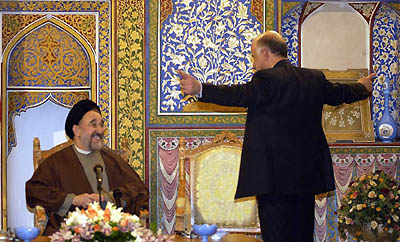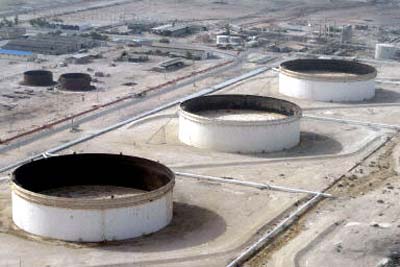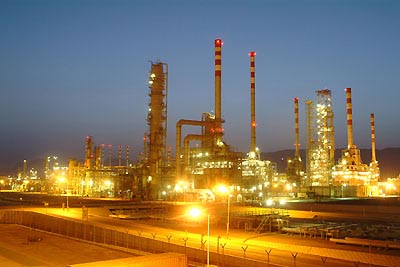SOURCE: KEN TAYLOR taylork021@hawaii.rr.com
POSTED: 16 January 2006 - 3:30pm
Iran playing a key role in world oil supplies

Iranian clergy faces secular oil minister
Oil
prices rise on concerns about Iran, Nigeria |
SOURCE:
JUAN WILSON juanwilson@mac.com
Energy-thirsty China is Iran’s
umbrella
16 January 2006 - 3:30pm
It would not be helpful ... We all want a peaceful solution to the Iranian issue. So I think the best place is the efforts between the EU (European Union) and (the) Iranians or the IAEA," China's UN ambassador Wang Guangya said this week. "The council has too many things on the table. Why should we add more?"Beijing's stance is partly because it has a policy of not interfering in other countries internal affairs, driven by the fact that it does not want similar outside interference in its own domestic matters.But mostly it is down to economic interests, in particular oil which China needs to keep firing its remarkable economic transformation, experts said.In 1997 China negotiated a 1.3 billion dollar contract with Saddam Hussein to develop the al-Ahdab oil field in central Iraq, and in 2001 it was in talks develop the much larger Halfayah field."Between them, the two fields might have accounted for almost 400,000 barrels per day, or 13 percent of China's oil consumption in 2003," said Michael Schwartz, professor of sociology at the State University of New York who specialises in Iraq and Iran."However, like Iraq's other oil customers (including Russia, Germany and France), China was prevented from activating these deals by the UN sanctions then in place ..." When the US invaded and set up the Coalition Provisional Authority all pre-existing contracts and promises were null and void, wiping out China's stake in Iraqi oil fields.So it turned to Iran, and sealed a 70 billion dollar contract to import Iranian oil, and has since signed a host of other economic agreements, including building the first stage of the Tehran subway system."In other words, the war in Iraq - and the resistance that it triggered - played a key role in creating a potentially powerful alliance between Iran and China," said Schwartz.Ehsan Ahrari, an independent strategic analyst based in Virginia who regularly writes on Iran, said that for these reasons, China will never agree to the Iran issue being taken to the Security Council." China has been strengthening its ties in Iran, most importantly, in the energy field. It also has been doing business with Iran in the transfer of missile, and even nuclear technology," he said on his website www.ehsanahrari.com."China's voracious energy appetite is in dire need of Iran's considerable oil and gas reserves. It also needs a lot of hard cash to pay for the ever-escalating prices of oil in a bullish seller's market."As long as Iran needs China's missile and nuclear technologies, Beijing expects its oil purchase bills to become eminently manageable. "Consequently, the Iranians are feeling comfortable that they have reasons to count on China's support if the EU-3 (France, Germany and Britain) and the US were to go to the Security Council."China has a voracious appetite for oil to feed an economy ticking along at 9.5 percent annual growth, and has been searching for supplies in all parts of the globe.The world's most populous country expects to import 130 million tonnes of crude in 2005, up from last year's record high of 122 million tonnes, making it the second largest importer in the world after the United States. |
SOURCE:
JUAN WILSON juanwilson@mac.com
Bush actions in June point to US screwup
16 January 2006 - 3:30pm
Bush
criticism of Iran vote backfires China
Rocks the Boat with Iran Oil Deal |
see also US Covert operations give victory to Mullahs for more detail

